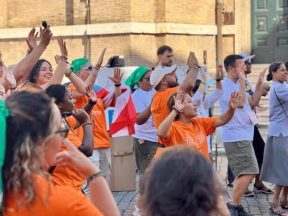Pope Leo XIV and the Missionary and Synodal Global Village.
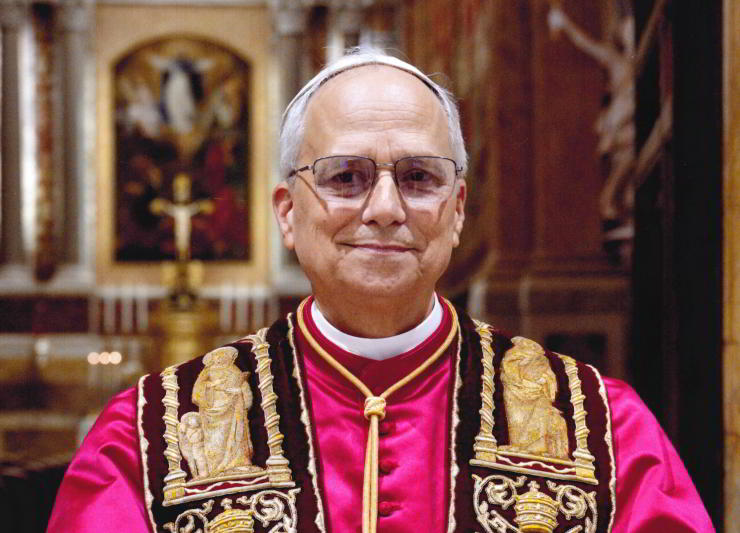
The search for peace, justice and truth. These will be the guiding principles of his pontificate. A church that is open to the challenges of the world, missionary and synodal.
In his first speech as Pontiff, which was just over 530 words to ‘the city and the world’, Leo XIV pronounced the word “peace” nine times. The content of his words was not just a greeting but a programmatic speech. A few days later, receiving those participating in the Jubilee of the Eastern Churches, he relaunched the appeal to bring back to the world the “dignity of peace”. He says: “For peace to spread, I will make every effort” and the Holy See is available “For enemies to meet and look each other in the eye, so that people are given back hope and the dignity they deserve, the dignity of peace.”
The Pope addresses the leaders of the peoples directly and “with his heart in his hand”: “Let us meet, let us dialogue, let us negotiate!” Then he reiterates the appeal for “the weapons to be silent” in all those regions wounded by conflicts and brutal actions: “From the Holy Land to Ukraine, from Lebanon to Syria, from the Middle East to Tigray and the Caucasus, so much violence!”.

“The dignity of peace.” 123rf
The Pope continues: “Peoples want peace. War is never inevitable, weapons can and must be silent, because they do not solve problems but increase them; because those who sow peace will go down in history, not those who reap victims; because others are not first and foremost enemies, but human beings: not bad people to be hated, but people to talk to.”He followed the same lines when meeting the diplomatic corps accredited to the Holy See. The three words that Pope Leo XIV emphasised in his speech were: Peace, Justice, and Truth. Peace, understood not only as the absence of war but as an “active gift” that is built starting from the heart and language and that aims to leave behind old and new “disputes”.
The Pope spoke of Justice because “the Holy See cannot refrain from making its voice heard in the face of the numerous imbalances and injustices that lead, among other things, to unworthy working conditions and increasingly fragmented and conflictual societies. It is also necessary to work to remedy global disparities, which see opulence and poverty trace deep furrows between continents, countries and even within individual societies.”
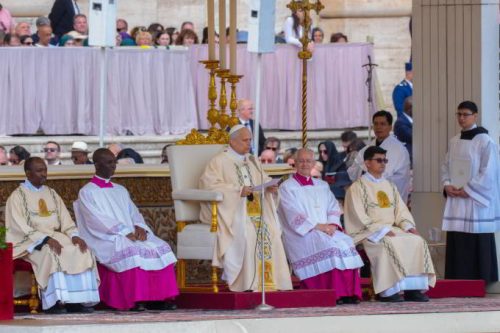
Pope Leo XIV presiding over his inaugural papal Mass. “The truth is never separated from charity” Photo: COL. EMB/Juan Cano
Finally, he spoke of Truth “Because truly peaceful relations cannot be built, even within the international community, without truth. Where words take on ambiguous and ambivalent connotations and the virtual world, with its changed perception of reality, takes over without control, it is difficult to build authentic relations, since the objective and real premises of communication are lacking”. “A frank language is needed, which can give rise to some initial misunderstanding”. Drawing on the Augustinian charism, he then recalls that “truth is never separated from charity, which at its root always has concern for the life and good of every man and woman. Moreover, in the Christian perspective, truth is not the affirmation of abstract and disembodied principles, but the encounter with the person of Christ himself, who lives in the community of believers. Thus, truth does not distance us, but rather allows us to face with greater vigour the challenges of our time, such as migration, the ethical use of artificial intelligence and the protection of our beloved Earth. These are challenges that require the commitment and collaboration of all, since no one can think of facing them alone.”
Pastoral experiences
The man who became Pope Leo XIV was one of the last leadership appointments of Pope Francis. Whether in the leadership of the Roman dicasteries or congregations or in the cardinalate, his appointment did not last more than three years. One could say that he belongs to the group selected by Francis for the generational passage. Like many of those who have been chosen in this way, he was brought from a place where he was not making a career.
Born in the United States, he is a member of an order, the Augustinians, which is inspired by one of the greatest thinkers of both the Church and humanistic reflection; he worked in Latin America as a priest and as a bishop for a good number of years.

Monsignor Prevost visits the district of Illimo during the floods in the area. (Photo diocese of Chiclayo)
From this context, so closely linked to pastoral experiences, Francis brought him to a key position in the Church, the Dicastery for Bishops, responsible for analysing and proposing the best candidates for the episcopate. His knowledge of the Latin world helped Leo XIV to understand migrants and to show solidarity with them. His ability to speak clearly, his love for the poor and his closeness to dialogue prepare him to be a good leader for a Church that needs to maintain a clear evangelical word in today’s tormented and bellicose world. The Augustinian values, undoubtedly strongly lived both in study and in prayer, prepare him to face the challenges of the Church. “To dwell in the house with one heart and one soul turned to God”, a fundamental Augustinian norm, pushes us to love, to fraternity and to care for our common home. The famous phrase of St. Augustine in his reflections on the Trinity: “We seek as those who have not yet found seek, and we find as those who have yet to seek find”, marks an indispensable attitude for the government of the Church today.
The response to the challenges that history poses to the Church cannot consist in closing oneself in the past, but in seeking answers that open up to new realities and new research.
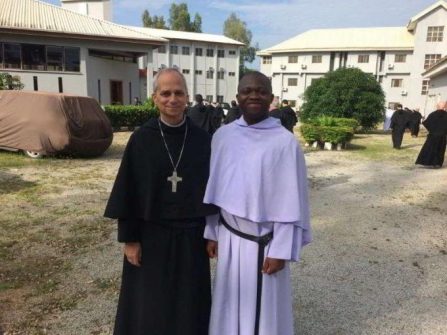
Fr. Robert Prevost, OSA, the future Pope Leo XIV, with Fr. Sunday Ikpe, OSA, in Nigeria. (Photo archive OSA)
The choice of the name Leo, which fits into a history of transformation of the Church, is also significant. After a long ecclesiastical period in the 19th century, in which the hierarchy, accustomed to speaking from power, could not find a way to relate to the world, Leo XIII abandoned the dangerous tendency to systematic condemnation and began to speak of the new realities of the world starting from the inspiration of the Gospel and the wisdom of experience. With him, the social doctrine of the Church was born, and continued to develop with his successors, and, translated into Latin America by the episcopate of the subcontinent, has borne fruit in terms of development and many testimonies of martyrs. Choosing the name of a pope who opened the Church to dialogue with the world means committing to continue the path of the Second Vatican Council. A path of permanent internal reform, in which the Gospel is lived and proclaimed; a path of dialogue aimed at building a more fraternal, more just and more attentive world for the good of all.
A Missionary Church
From the Loggia of St. Peter’s Basilica, Pope Leo XIV said: “We must seek together how to be a missionary Church, a Church that builds bridges, that builds dialogue, always open to welcoming everyone, like this Square, with open arms, to all those who need our charity, our presence, dialogue and love.” Pope Leo XIV was elected by the most universal conclave in the history of the Church, with representatives of 71 countries in the Sistine Chapel. There were pastors of very small Catholic communities who live in cities and regions that are never in the spotlight of the world. With a rapid and broad ballot, a pope with many years of missionary experience was chosen.
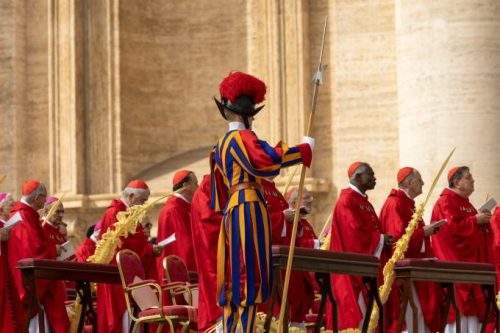
It was the most universal conclave in the history of the Church, with representatives of 71 countries around the world. Shutterstock/Fabrizio Maffei
The Cardinals wanted to indicate a path already traced by Pope Francis to be an “outgoing” Church. All Missionaries were happy to hear the Pope speak in Spanish, greeting and thanking his diocese of Chiclayo, in Peru. “And if you allow me a word, a greeting to everyone and especially to my dear diocese of Chiclayo, in Peru, where the faithful accompanied their bishop, shared their faith and gave so much, that they continue to be a faithful Church of Jesus Christ”., has a strong symbolic value not only emotional but of belonging to the lands where missionaries work and accompany the journey of the communities. And finally: “I am a son of Saint Augustine, an Augustinian, who said: “With you I am a Christian and for you a bishop”. In this sense, we can all walk together towards that homeland that God has prepared for us. (Open Photo: Pope Leo XIV) – (Photo: Vatican Media)
Francis Mutesa



